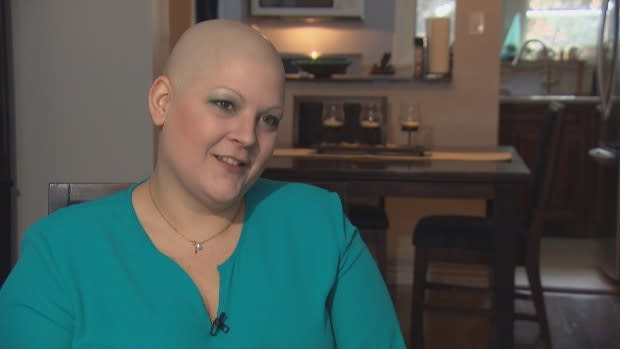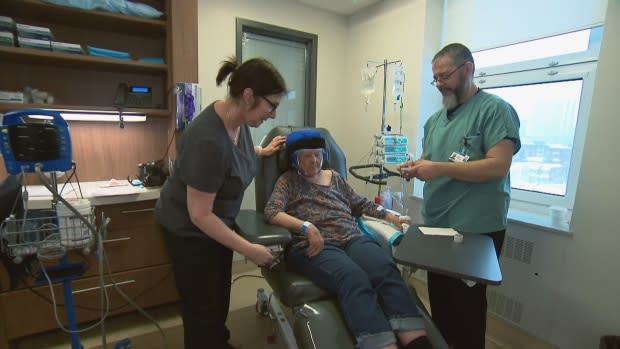Access to chemo 'cold caps' varies, patients find

A "cold cap" treatment that aims to limit hair loss during chemotherapy is available in Gatineau, Que., but not in Ottawa, in part because the medical community remains unsure about the treatment's effectiveness.
A cold cap is worn on a patient's head immediately before, during and after a chemotherapy session, reducing the temperature of the scalp and restricting blood flow to hair follicles.
While doctors caution results of the treatment may vary, it is currently available for free at the Gatineau Hospital for patients whose doctors recommend it, thanks to funding from the hospital's foundation.
But across the Ottawa River in Ontario, it's up to patients to arrange for access to cold-capping machines, and to pay for it out of their own pockets. Currently, the treatment isn't available anywhere in Ottawa.

Hair loss 'not an easy thing to deal with'
Ottawa mother Kelly Richer, 32, said she wishes she had easier access to the treatment while undergoing chemotherapy for a rare liver cancer.
"I just feel like having that option would be phenomenal for quite a number of people," said Richer, who has lost all of her long blond hair from her chemotherapy treatments.
"I'd be in the shower, I'd notice chunks of my hair coming out in the back and you know, kind of just watching it go down the drain. It's not an easy thing to deal with."
Richer said it's "aggravating" to know there is different care available for free "across the bridge."
Gatineau success story
Nadia Drouin, 42, received the treatment free of charge at the Gatineau Hospital thanks to the Fondation Santé Gatineau. She said the scalp-cooling treatment allowed her to keep most of her hair during her chemotherapy treatment.
"Having hair, I feel more healthy, because when I don't have hair I'm kind of skinny, so I look sick. But when I have hair, it's like if I have confidence that I will survive from cancer. So I'm really happy about that," Drouin said.

"When my doctor told me about the cold cap, I said, 'I will do some research on the Internet,' and I saw that in some countries it's pretty popular and people are doing it very frequently," said Drouin, who began undergoing the treatment in 2018.
She said her doctor warned her the treatment isn't always effective. Drouin said it was uncomfortable at first, likening the sensation to sticking your head in a snowbank. But it worked.
"Even the nurse was kind of surprised, because I was one of the first one trying it in Gatineau. So it was fun to see [the hair] growing every time I was going for a treatment, and they were seeing me having more hair, more hair. So it was really nice to see, and I was really happy, too," Drouin said.
Not for every patient
Chemotherapy drugs target all rapidly dividing cells in the human body, including hair cells. That's why some types of chemotherapy cause hair loss, according to Julie Lemieux, an oncologist at the Centre hospitalier de Québec-Laval University in Quebec City.

Lemieux confirmed cold-capping results vary, and it's only an option for patients receiving certain types of chemotherapy.
"For some cancer, you would not want to use cold cap. For example, for a patient with leukemia, because there's cancer in the blood cells and blood goes through your scalp, you don't want to have cold cap because you don't want to decrease the chemo that will get everywhere."
Lemieux, who mainly treats women with breast cancer, said she has been offering scalp-cooling to her patients since 2006. She doesn't have access to the same machine that Nadia Drouin used in Gatineau, which keeps the cap cold. Instead, the caps Lemieux's patients wear must be frequently switched out with fresh ones stored in a freezer.
Treatment requires resources
Lemieux said the cap is placed on the patient's head about 20 minutes before treatment starts, and kept on for up to 90 minutes after, so providing the treatment requires resources.
"If there's the resources, [cold-capping] will be a good idea for patients. But we need also to have the resources, because it takes more time for each patient," she said. "It's difficult to find the time."

Neither Ontario's Ministry of Health nor Quebec's Ministry of Health and Social Services provide direct funding for cold-capping, and said availability in each province depends on individual hospitals.
In Toronto, for example, there are currently scalp cooling machines at Princess Margaret Hospital, Sunnybrook Health Sciences Centre and Mount Sinai Hospital, but none of those machines was purchased by the province. No hospital in Ottawa currently offers cold-capping, and the Ottawa Regional Cancer Foundation said it doesn't provide funding for the treatment.
The Ontario Medical Association said it can't comment on the treatment's effectiveness, but the ministry said in a statement it will request Cancer Care Ontario, the government's cancer adviser, to provide an opinion on the treatment's effectiveness and "possible use for Ontario patients, at all facilities."
Health Canada's website shows it has issued a licence for the same scalp cooling device Nadia Drouin used at the Gatineau Hospital. Asked by CBC if it's currently conducting any studies into scalp cooling machines, Health Canada said it's "not reviewing the effectiveness of these devices."


